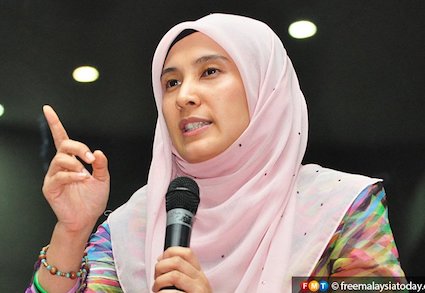This is about principles, not Nurul Izzah

Charles CJ Chow, Free Malaysia Today
I like Nurul Izzah Anwar. But this is not about her. It is about civil society.
Her appointment as finance and economic adviser to her daddy, the prime minister, is something that we should not have to write about. Because it should never have happened.
But because it has, we must write about it. Not because we want to vilify Nurul Izzah or Anwar Ibrahim, but because although we like Nurul Izzah, we want civil society to be more than just words.
In truth, Anwar has done a disservice to Nurul Izzah by appointing her.
Amidst the furore, she is put in the unenviable position of having to defend her qualifications for the job. Even daddy has had to step forth to defend her suitability.
Not many are convinced with his advocacy that her academic qualifications make her a great economic adviser to the government. Nor with his throwing out the red herring that she will not be paid.
Whatever the arguments around whether she is qualified for such a position, the fact remains that she ought not to be there. No matter how you spin it, it is nepotism, pure and simple.
Nepotism is anathema to effective governance. Committing it renders loudly espoused principles of civil society mere sermons, full of sound and fury, signifying nothing.
It is because of all these civil society catchy slogans that I cannot for the life of me, understand how this could have come about.
Unexpected. Unbelievable. Unnecessary.
Considering his coterie of advisers, why didn’t anyone warn PMX of the repercussions of this clumsy mistake?
Surely, for a reform-minded prime minister, a choice between fatherly love and good governance is an easy one to make, because there are other options for Nurul Izzah.
If, as some have postulated, that she is “PM-material” and this is some sort of prime ministerial-training, then this contentious appointment will only taint her record.
If she requires training to be a future prime minister, she would be better off joining the private sector where she will see what the real world is like.
She would learn important skills such as leadership, accountability, organizational development, human resource management, financial responsibility, communication strategy, budget strategy, etc., while being assessed by a boss who is emotionally-objective.
And she would be paid too.
Civil society is undergoing a trial.
Overdue reforms need to be made – to Parliament, education, healthcare, enforcement institutions, and the civil service, as well as for the better administration of our national finance, racial and social justice, equality and inclusion, environmental sustainability; you name it; you know it.
Recommendations for reform, made by the Institutional Reforms Committee in 2018, are available but have been mysteriously kept from the public eye.
With each passing day of abundant talk but little action on the part of our ministers, civil society is fading. We can only take so much of “we are going to do this, and we are going to do that”. Good intentions are fine, but you know what they say about that proverbial road.
Our ministers tend to solve policy errors with denials and spin. Unjust laws are still being used against our youth for holding music gigs, whistleblowers and those who make official reports about the commission of election offences.
Criminal cases have been withdrawn by enforcement agencies without proper explanation. The attorney-general’s prosecutorial discretion continues to be absolute and his conflicting roles as legal adviser to the government and the public prosecutor remain unchanged. The anti-hopping law is nebulous.
Sometimes it feels like we are walking a tightrope without a balancing pole.
We are already paying the price for realpolitik being forced down our throats. Our expectations have been somewhat lowered. We are half-happy. We are anxious all the time with the sword of Sheraton hanging over us.
We understand it is hard for anyone to be in the tenuous position of preaching anti-corruption while a choir of crooks sing from the same pulpit.
Hence, we bend backwards to justify the inconsistencies, to forgive readily.
But it would be difficult for us to accept any intransigence that is an obvious betrayal of fundamental principles. Nepotism is one.
While we have come to expect impunity from previous “un-Madani” governments, we have sacrificed too much to accept the same from this one.
If Anwar does not defend the very principles upon which civil society depends, how can he expect others to do so?
As we applaud the many things PMX is trying to do and the wonderful words he constantly says, we must also raise our voices against his mistakes and oversights.
The democratic civil society that we want can be achieved only if we speak out against the inconsistencies, intolerance and inertia that have set in among our leaders.

